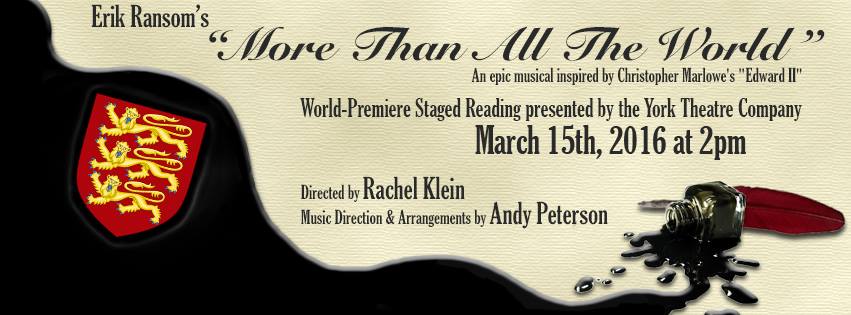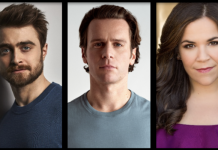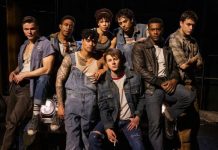Known for his bold cutting-edge artistry and glam-rock/drag personae, Erik Ransom commands the stage as a singer, musician, and actor, and behind the scenes as a composer, lyricist, and playwright. Among Ransom’s past successes, as both creator and star, are Coming: A Rock Musical of Biblical Proportions, in which he takes an irreverent post-modern look at a traditional religious subject, and GRINDR The Opera, a musical parody of the popular gay hook-up app.
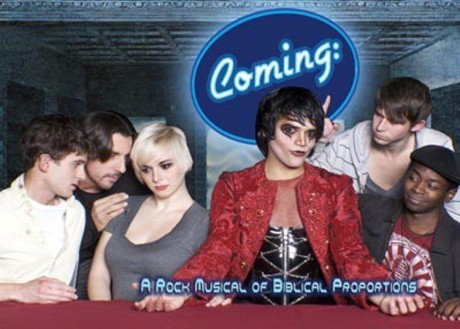
As part of its Developmental Reading Series, York Theatre Company, for which James Morgan serves as Artistic Director, will present the world-premiere performance of Ransom’s latest original musical, More Than All the World, on March 15 at 2 pm. Taking its inspiration from Christopher Marlowe’s Edward II of 1593, Ransom’s new work sets the Elizabethan bio-play about the 14th-century English monarch to a theatrical pop/rock score and infuses it with 21st-century import.
Deb: How does More Than All the World differ from your other work, and in what ways is it characteristic of your signature style?
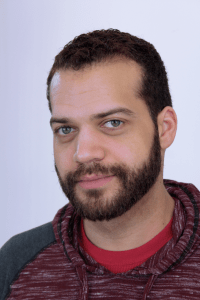
Erik: The first way in which it differs is it’s PG-13! Most of what I’ve done before has been rather risqué and explicit, which has a particular, enthusiastic audience, but can prove prohibitive in commercial theatre. This one should have a wider appeal for the general public as a clear-cut epic, with a large cast, a grand design, a throne, and all the classic ingredients. It’s also my first adaptation; everything I’ve done to date has been original, but this one has historic figures and is inspired by an existing 16th-century play. I use the framing device of playwright Christopher Marlowe telling the story, but I’ve expanded on Marlowe’s narrative to span over 20 years in Edward’s life, beginning with his youth during the reign of his father Edward I, and going up to the time of his demise. I’ve taken some quotes from Marlowe, but as with my usual style, there’s original dialogue and a lot of music. What’s also similar to my usual style is the type of music; it’s in the same realm of combining pop with theater. But this is the most intricate work I’ve ever done, with more layers. I feel like each time I write something new, I’m developing as an artist and increasing the complexity. So with this, I’m a 21st-century writer telling Marlowe’s Elizabethan story telling Edward’s medieval story, to show the commonalities of the core themes throughout the centuries.
When did you first become interested in Edward II?
I happened upon the play in college, and because it was in the public domain, I was able to read it online. I couldn’t believe that, in his time, Marlowe could have written about such an explicitly queer subject so sympathetically! I later found out that he is considered the first writer to have done so. I took some monologues from the play and set them to music, as arias, while I was a Music student. Years later, I wanted to try to do an adaptation of an historic work. I remembered Marlowe’s play, and started working on it right after I premiered Coming, in 2011.
What themes from his life did you want to explore?
Edward was a very controversial historic figure, and still is to this day. He has essentially been a footnote between his father Edward I “Longshanks” and his son Edward III, both of whom are considered to be among England’s greatest monarchs, whereas he’s been seen as the bad king who failed. Edward I conquered Wales, and his throne is still used as the Coronation Throne in England today—even Queen Elizabeth II was crowned on it. Edward III, who declared the Hundred Years’ War against France, was known for his powerful military successes, and also as the father of the rival houses of Lancaster and York, founded by his sons and culminating in the War of the Roses. But Edward II was fascinating as a person. He had an obsessive nature and his specific interests were very imbalanced. When he was obsessed with something, he gave it all of his focus and ignored everything else. He was very open about whom he loved—completely and unabashedly—so I wanted to consider the power of obsession and love. He’s really a classic tragic figure, with marked flaws in addition to his many sympathetic qualities.
How do you view his character, which you’ll be playing in the reading?
He is single-minded and fully consumed with love. The progression of his life in More Than All the World is that he starts out young and naïve, as we all do, then as an adult he lives in the shadow of his great father and is faced immediately with opposition. His father felt that he needed a good influence in his life, so he’s the one who introduced him to Piers Gaveston, a respected knight who would become the love of his life. After Gaveston was exiled by Longshanks, Edward II’s very first act as king was to recall him to England, against the deathbed wishes of his father. That kind of obsession with his lover characterized his reign; they almost ruled together in a kind of dual monarchy, and as a result, Gaveston, born a peasant, was resented by the nobility, who defamed him as a gold-digger. After Gaveston was executed, Edward II’s next lover truly was a pirate–everything they accused Piers of being but wasn’t.
Did you update Marlowe’s language in your libretto to better relate to a current audience, or did you retain some of the historical flavor?
It is not modern speech, and it is not Elizabethan speech. There are Elizabethan terms and some period slang, but the audience doesn’t need a glossary! It’s colorful language–more like Game of Thrones. There are a few quotes from Marlowe’s Edward II and some of his other plays, and one of my scenes is taken almost directly from Marlowe, but my work gives more focus to the other characters, it’s not solely about Edward.
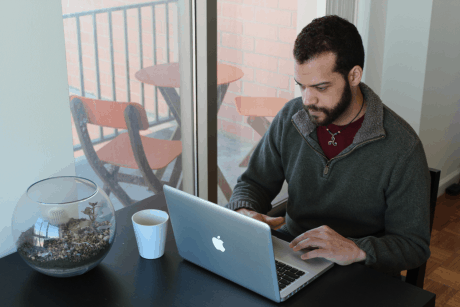
What are the challenges in adapting a classic?
There are two things at work here: 1: adapting Marlowe’s classic and representing his interpretation of the characters; and 2: depicting the real historical figures. The hardest part in doing an adaptation is deciding what goes into the play–what to cut and what to include–with a little updating of the terminology. For example, when addressing the King during Edward’s era they said “Your Grace”–“Your Majesty” and “Your Highness” were not used at the time. But many of the same struggles in the story recur in the 14th, 16th, and 21st centuries, so I wanted to make the figures and the period more relatable, and had to make decisions. I also felt more of a responsibility this time than ever before in trying to humanize the characters, since they were real people. I especially was concerned about Edward’s Queen Isabella, who is ultimately the primary antagonist of the piece. She starts out as an ingénue, and then is the one who leads the revolt against her husband; she becomes powerful and garners the support to have him deposed. But he was far from blameless in invoking her legendary wrath. She was his wife and a renowned beauty, and his wanton neglect of her in favor of his male lover was humiliating.
You and director Rachel Klein have worked together on past projects. What does she bring to your work in general, and to this one in particular?
She understands my aesthetic and did from the very beginning; we connected right away. Often artists try to do more than they can realistically handle, but there’s a symbiotic relationship with Rachel. We know where our strengths and weaknesses lie, and I think we fill in the gaps for each other. United alongside the rest of our creative team, we’re a master of all trades! Rachel and I share an epic sensibility and she is marvelous with visuals. This show calls for that, so knowing how her brain works, it will be resplendent. Plus I like the way she works with actors; she’s terrific, and she knows that she doesn’t need treat me differently as an actor just because I wrote it. We’ve worked together enough to be comfortable that way. I like that; there’s no tension.
Who else is on the team and in the cast?
Andy Peterson is arranging and music directing. He’s done things in his native Australia and worked on Atomic Off-Broadway two summers ago. I had never been so taken by a musical arrangement, so I reached out to him on Facebook. He has a great sense of the majestic and he gets my style, so he can improve upon it with his arrangements. We went through Michael Cassara Casting for the ensemble, and I’m very excited because so many of them are new to us; Rachel and I had never worked with about half of them. We needed top-notch actors as well as great singers, and we got them! Paul Iacono, who plays Edward III, is a TV and film star; Mel Johnson Jr. (Edward I) was on Broadway in The Lion King and also appeared in the film Total Recall with Arnold Schwarzenegger; Kate Loprest (Queen Isabella) has done a lot on Broadway; Rachel Izen, who is the only legit Brit in our very English musical, was in Thoroughly Modern Millie on the West End and Les Misérables on Broadway; and it goes on and on with this tremendous cast. I am also very pleased with the diversity we’ve been able to represent. It’s become a big issue with the Oscars and in Hollywood, but we have an African-American Edward I and a Latino Archbishop of Canterbury (Luis Villabon), among others. The open casting doesn’t in any way detract from the story, it just makes more roles available and gives more opportunities to actors who may not traditionally be considered for certain roles.
What are your future plans for the show?
I’d love to tour More Than All the World regionally. This is my most accessible play–with queer themes but not a gay show–and it has something for everyone and someone to whom everyone can relate. It’s musical, epic, historic, romantic, and tragic, so it really should hold widespread appeal. I can’t wait to see how audiences respond to it, since I’m already very happy with the cast’s response. I can say at this point that I’m cautiously optimistic that it could be done regionally or, who knows? This is the first time we’re putting this show in front of an audience so, in my mind, the sky’s the limit. I was also thrilled that Kathryn Warner, who wrote the book Edward II: The Unconventional King (Amberley Publishing, 2014) and is the foremost historian on his life, loved the play and its combination of fact with historical fiction. She was a wonderful resource to work with; I ran things by her as I was writing, and she read an early draft and gave me encouraging feedback! I’m very grateful she was so generous and enthusiastic about discussing our favorite medieval monarch.
What other projects do you have in the works or in mind for the future?
There’s more of GRINDR coming up, and other projects in the works that I can’t discuss at present, which are just going into contract. One I can talk about is Shooting Star, for which I’m doing the lyrics. It’s being developed by a German team in New York and Berlin— Florian Klein is writing the book and the music is being written by Thomas Zaufke, a noted German theater composer–but our collaboration is in English, with the hopes of an Off-Broadway run. I’ll update you on the others as soon as I can.
Many thanks, Erik; I look forward to the reading, and to hearing more about your future shows!
More Than All the World will be presented by York Theatre Company at 2 pm on March 15, 2016, performing at Saint Peter’s Church – 619 Lexington Avenue, LL2 (enter on 54th St.), in New York City. For information, call the box office at (212) 935-5820, or visit online


